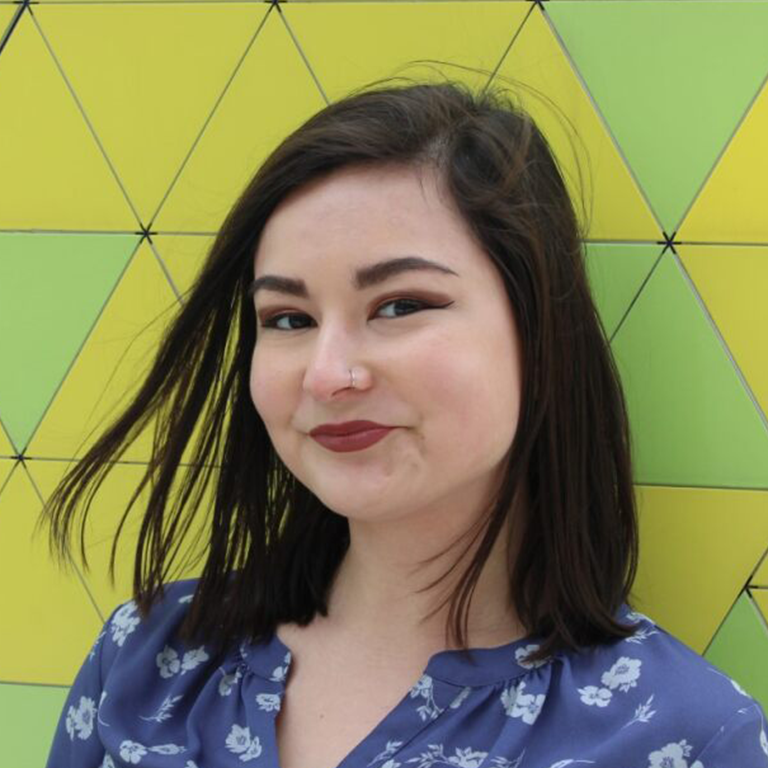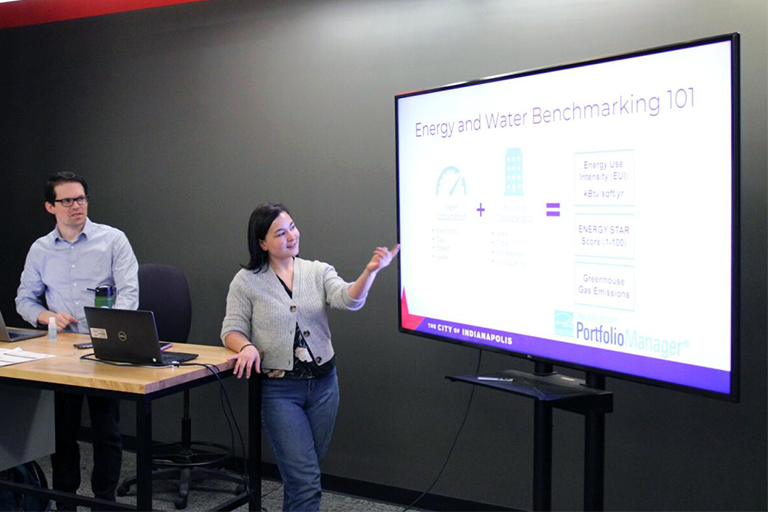This Q&A series highlights McKinney Climate Fellows alumni and their professional journeys within Indiana and beyond. The McKinney Climate Fellows program, administered by Indiana University’s Environmental Resilience Institute and Integrated Program in the Environment, connects IU undergraduate and graduate students interested in climate, sustainability, and community resilience with career experiences.
Working with Keep Indianapolis Beautiful as a 2020 McKinney Climate Fellow, Madison Byarley got to know the people of Indianapolis and the rich histories of local neighborhoods as she helped manage pocket parks throughout the city. The experience introduced her to working at the community level, where building relationships is critical to organizational success.
After earning her master’s degree from the IUPUI O’Neill School of Environmental and Public Affairs, Byarley’s ties to the local sustainability community helped her land a job with the City of Indianapolis Office of Sustainability. There, she manages the city’s Thriving Buildings program, which works with local building owners to track energy use and save on utilities.
The following interview has been lightly edited for length and clarity.
What major projects did you work on during your Keep Indianapolis Beautiful placement as a McKinney Climate Fellow?
I was on the native landscapes team, and I mainly helped with AES Indiana Project GreenSpace. This program builds pocket parks around the city, targeting areas where people have less access to green space. I helped install a couple of them. Outside of that, I evaluated the pocket parks. I would go around the city with a rubric and would grade the parks to find out if they needed extra work or if they were doing all right. I also did some community engagement work, like reaching out to different groups about hosting pocket parks or volunteering at certain parks.
What did you learn as a McKinney Climate Fellow and how did it inform your career path?
I learned a lot about how to best engage with diverse communities and about equity and inclusion. It informed my career path. I still work at the local level, specifically in local government. I keep things I learned about DEI in the back of my mind as we plan events in the same city, thinking about how to make them accessible and equitable for our diverse communities within the city.
When I was at Keeping Indianapolis Beautiful, I went to all the different neighborhoods that each have unique histories and stories. That was helpful for what I do now, as I continue to work with different neighborhoods. I have a lot more background on their history, and it's helpful for building relationships and trust within these communities.
What called you to pursue a career focused on climate and sustainability and why did you decide to work in Indiana?
I’ve always been interested in nature and the environment, even as a little kid. I didn’t understand that the environment was threatened and at risk until I was older. Once I learned that in middle and high school, I wanted to protect these things that I care so much about. I originally was interested in natural resources and environmental science, but then transitioned to the policy route, which is how I ended up in local government.
I wanted to stay in Indiana because there’s a lot of people doing good work here and the sustainability community is tight knit. However, we’re still just getting started on some of the same programs that other states have been doing for a while. It's nice to help us get caught up.
What is your current position and what responsibilities does your job include?
My current position is the Thriving Buildings program manager for the City of Indianapolis Office of Sustainability. My main role is managing our benchmarking and transparency program called Thriving Buildings. We had an ordinance passed in 2021 that focused on getting building benchmarks, which is tracking their utility data or their energy from gas, electricity, and water use. We’ve seen from other neighboring states that, just by tracking this data, they have cut back on energy use and thus lowered their greenhouse gas emissions.
Indianapolis is the only city in the state to have a benchmarking ordinance. I answer a lot of questions related to the program and host Q&A sessions on the process. I then track all the data that we receive from the buildings and manage our internal buildings that the city owns. I’ve also expanded to work on anything that is energy and built environment related.




